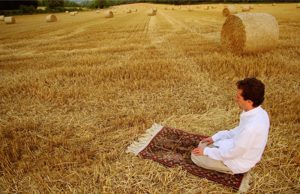The Partnership and the Arts

By Tristram Riley-Smith
The Art of Integration – Islam in our Green and Pleasant Land is the title given to an exciting exhibition that opens at the Centre for the Study of Pakistan at SOAS next week.
The exhibition is linked to the Muslims, Trust and Cultural Dialogue project being undertaken by Partnership Leadership Fellow Professor Peter Morey, and is ‘a visual introduction to the diversity of British Islam’. It draws on the work of photographer Peter Sanders who has spent five years travelling around the United Kingdom seeking to understand and record a side of Islam rarely displayed in the media. The focus of Peter’s work is on integration as opposed to assimilation or alienation. You can now view the flyer for the exhibition.
I have a fascination in the part that visual and performing arts play in shaping and sustaining social values and narratives. The outcome not always benign or positive: research by Dr Sara McDowell of the University of Ulster into commemorative parades linked to the Irish Troubles, shows that wounds can be re-opened and divisions maintained (although the unveiling or existence of physical memorials does not tend to instigate violent conflict). Partnership researchers like Professor Peter Morey, Professor Caroline Rooney and Dr Wendy Pullan are developing profound insights into the way in which theatre, film, poetry and architecture can create conditions that promote engagement and empathy and undermine conflict and hatred. Caroline is actively involving herself in the creative process, and over the last year has produced a play, Keepers of Infinite Space, and a film, White Flags.
As External Champion, I am committed to supporting impact from every academic discipline, ranging from Behavioural and Social Sciences to Engineering and Physical Sciences. But my own doctoral research, 35 years ago, was as an anthropologist of art, working with the traditional ‘god-makers’ of the Kathmandu Valley who cast metal images of both Hindu and Buddhist gods, so I feel a particular affinity to the humanities.
It is, then, with the greatest pleasure that I will be chairing a panel at tomorrow’s Centre for Science and Policy conference entitled Art and Memory: Conflict and Conflict Resolution. Two remarkable artists – Sejla Kameric and Glenn Sujo – will join me to discuss the way in which art has explored the horrors of displacement, discrimination and crimes of war both in Bosnia and during the Holocaust. Kathleen Palmer, Head of Art at the Imperial War Museum, will also take part in the panel, discussing how the Museum collects and uses art to engage audiences in thinking about modern war and conflict, from the First World War through to today. It is going to be a fascinating session.
Dr Tristram Riley-Smith is the External Champion to the Partnership. He was appointed to the role in April 2013. He is also Director of Research at the University of Cambridge Department of Politics and International Studies and an Associate Fellow at the Centre for Science and Policy.




